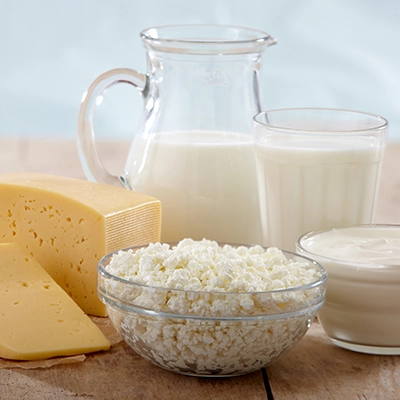Cheese and Health: Making Sense of the Fat Headlines
Advice to choose low-fat or fat-free milk, cheese or yogurt has not changed in 30 years, but the science on saturated fat, dairy foods and cardiovascular health has continued to evolve.
You may have seen recent headlines: This New Study May Justify Your Love of Cheese or High-fat Cheese: the Secret to a Healthy Life? So let’s look behind the headlines and consider what the research means for those you counsel to help them make nutritious food choices.
The growing body of observational evidence indicates dairy food consumption – regardless of fat content – may not be associated with increased risk for cardiovascular disease (CVD). Two recent publications add to this evidence base and provide new insights for full-fat cheese and health, while supporting results of previous studies showing no association of saturated fat or dairy fat consumption with CVD.
Researchers from Denmark conducted a 12-week randomized trial among 139 adults with two or more risk factors for Metabolic Syndrome (MetS). They evaluated the effect of replacing part of what participants usually ate with 80 grams (just shy of three servings) of full-fat cheese, reduced-fat cheese or a similar amount of carbohydrate-rich foods (bread and jam, for every 2400 calories they ate. Participants were also provided with a cup of fat-free milk per day, but were instructed not to consume any other dairy foods during the study period. Results showed that LDL- and HDL-cholesterol (LDL-C, HDL-C) did not differ statistically between groups – though HDL-C (i.e., good cholesterol) tended to be higher in the full-fat cheese group than in the carbohydrate group.
In addition, eating cheese, regardless of the fat level did not increase other risk factors of MetS including blood glucose, triglycerides, blood pressure or waist circumference. To imitate a real-life setting, researchers did not control the calorie level or macronutrient content of what participants ate, which enabled them to directly compare the effect of full-fat and reduced fat cheese as whole foods. This recent publication is the longest study to date showing no effect of eating full-fat cheese on LDL-C (i.e., bad cholesterol).
Another recent study examined the association of dairy fat consumption from all dairy foods with cardiovascular risk among adults enrolled in three large prospective studies (Health Professionals Follow-up Study, the Nurses’ Health Study, and the Nurses’ Health Study II – all affiliated with Harvard School of Public Health). Analysis from all three groups, either individually or when pooled together, revealed no association with dairy fat consumption and risk of CVD, coronary heart disease (CHD) and stroke.
The researchers then conducted statistical modelling to estimate the theoretical effects of substituting 5 percent of calories from different fat sources. Replacing dairy fat with an equivalent amount of calories from polyunsaturated fat or vegetable fat resulted in a lower risk of CVD, CHD and stroke, while substituting other animal fat for dairy fat increased the risk of CVD, CHD and stroke. Though this study did not look at how the composition of individual dairy foods independent of fat content might influence health, the researchers recognize previous studies in cheese, butter and yogurt in this regard and identify this as an important area for future research.
This study adds to the growing body of evidence about cheese and how it may fit into balanced eating plans. As this emerging area of research unfolds, we will continue to share the results with you.
Here are some resources that may aid your educational efforts:
- Science Brief: Whole & Reduced-Fat Dairy Foods
- Science Summary: Dairy & Cardiovascular Disease
- Cheese & Healthy Eating handout for general audience
- Cheese & Nutrition handout for Health Professionals















